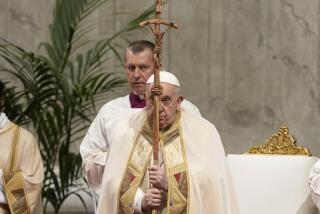A Reckoning for Harm to Jews
- Share via
Acknowledgment of wrongdoing in public life is hard to come by, whether from culpable individuals or institutions. And it is rarely accompanied by a principled discussion of what the culpable people or institutions must do to repair the harm.
Typically an apology is deemed sufficient. Pope John Paul II offered words of remorse for the Catholic Church’s role in the Holocaust. Yet only in an amoral world, where the powerful set the terms, would a few words be accepted as sufficient repair for enormous crimes and injustices.
Although the church did not cause the Holocaust, Pope Pius XII and clergy across Europe inflicted catastrophic injuries on Jews.
They spread the anti-Semitism from which Nazi anti-Semitism grew, and that led millions to support the Nazis’ criminal assault on the Jews.
They supported the criminal race laws and policies of Germany and its allies.
The Slovakian Catholic Church was complicit in the deportation of Jews to Auschwitz. In Croatia, priests murdered Jews.
After the war, the Vatican helped Adolf Eichmann, Dr. Josef Mengele and many other Nazi mass murderers escape to South America. The future Pope Paul VI helped lead the effort.
The church owes a substantial duty of repair to Jews.
Church doctrine supports this notion, holding, according to the official Catechism of the Catholic Church, that “one must do what is possible in order to repair” a wrong against one’s neighbor: “return stolen goods, restore the reputation of someone slandered, pay compensation for injuries.” The fullest repair is a “must,” an unavoidable moral duty.
Aside from compensation, what are the universal principles of repair? When applied to the Catholic Church, what concrete measures do they produce?
* Tell the full truth. The church must stop its aggressive cover-up of 60 years, open its archives across Europe and commission studies from independent scholars so the truth becomes known.
* Combat the continuing effects of the harm. Despite some progress, the church is still responsible for an enormous amount of anti-Semitism. Research shows that tens of millions of European Catholics still believe even the most damaging of age-old Christian libels, that Jews today are guilty or cursed for the death of Jesus. The church must institute extensive education programs in all countries at all levels of schooling and for adults. It must teach the falsity and perniciousness of such bigotry. It must, in the words of the catechism, “restore the reputation of [the people] slandered.”
* Transform all the unwholesome internal features that led to the harm so that the phrase “never again” is backed up by the necessary changes. The church must stop being a political institution embodied in the Vatican state, because that is antithetical to being a moral institution. Its politics to extend its sovereignty over all Jews and all humanity led it to harm Jews who only wanted to worship God in their own way.
The church also must stop spreading anti-Semitism in the Christian Bible and its liturgy. Imagine if a book, given to 2 billion people as the word of God, vilified blacks or Christians as children of the devil, incapable of hearing God, guilty and cursed for all time for the death of the son of God. People would be up in arms. Why should it be different when the victims are Jews?
The church must cease to pretend that its Bible does not spread anti-Semitism, and it must take measures to ensure that it no longer imparts such damaging prejudice.
We need to make moral reckonings a standard part of our public life and politics. The universal principles of repair are simple, yet like many moral principles they have thoroughgoing good consequences.
Applying this model of repair not just to the Holocaust but to all instances where repair, especially by the powerful, is owed would change the way many contemporary social and political issues -- not only regarding the church but also, for example, the debts the United States owes African Americans -- are approached. It would lead to greater justice for the victimized, reduce ongoing harm and prevent future injury.
More to Read
Sign up for Essential California
The most important California stories and recommendations in your inbox every morning.
You may occasionally receive promotional content from the Los Angeles Times.










